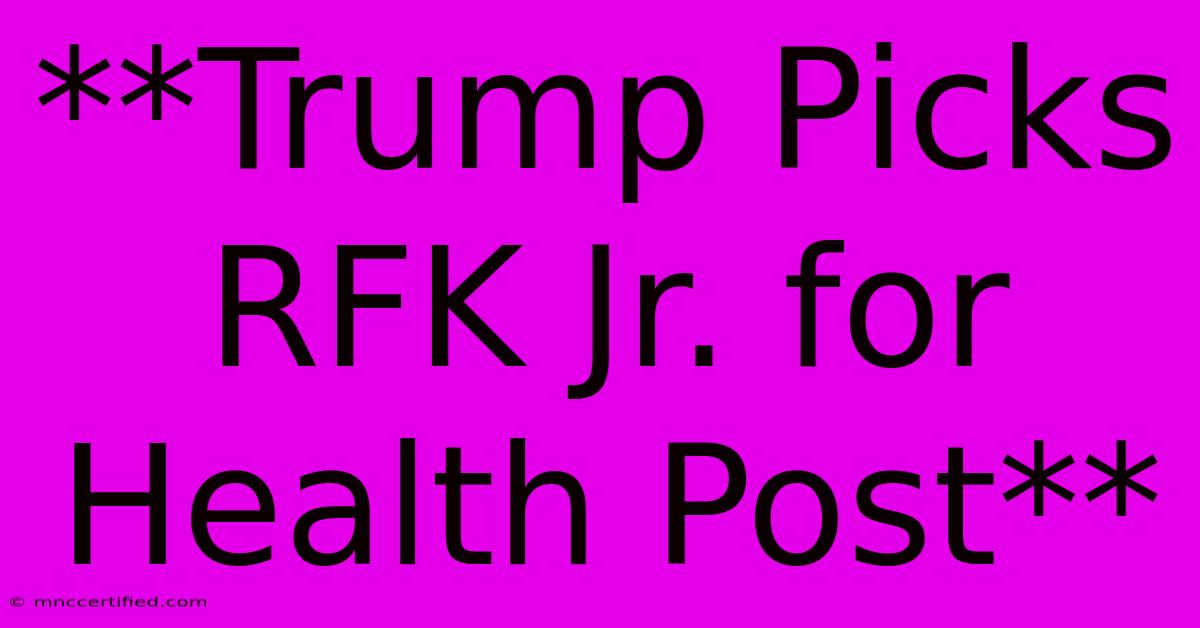**Trump Picks RFK Jr. For Health Post**

Table of Contents
Trump Picks RFK Jr. for Health Post: A Deep Dive into the Controversial Appointment
Robert F. Kennedy Jr.'s appointment to a health-related advisory role within Donald Trump's potential 2024 presidential campaign has sent shockwaves through the political and medical communities. This move, announced [Insert Date of Announcement], is undeniably controversial, sparking heated debates about vaccine hesitancy, misinformation, and the qualifications needed for such a significant position. This article delves into the key aspects of this appointment, exploring its implications and the ongoing public discourse.
Understanding the Controversy: RFK Jr.'s Anti-Vaccine Stance
At the heart of the controversy lies Kennedy's outspoken opposition to mandatory vaccination. He has consistently voiced concerns, often unsubstantiated, about the safety and efficacy of vaccines, particularly those against measles, mumps, and rubella (MMR) and COVID-19. These views, widely criticized by public health experts as promoting vaccine hesitancy and endangering public health, have made him a prominent figure in the anti-vaccine movement. His statements have been linked to increased vaccine refusal rates and outbreaks of preventable diseases.
The Scientific Consensus and Kennedy's Claims
The overwhelming scientific consensus supports the safety and efficacy of vaccines. Numerous peer-reviewed studies have confirmed their crucial role in preventing infectious diseases and saving millions of lives. However, Kennedy has repeatedly challenged this consensus, citing anecdotal evidence and unsubstantiated claims. This stark contrast between his views and established scientific findings forms the basis of much of the criticism surrounding his appointment.
Trump's Rationale and Political Implications
Donald Trump's decision to appoint Kennedy remains a subject of intense speculation. While the exact reasons behind this choice haven't been explicitly stated, several interpretations exist. Some suggest it's a calculated move to appeal to a segment of the population skeptical of government health initiatives and mainstream medical narratives. Others believe it reflects a broader disregard for established scientific expertise within the Trump political sphere.
The Impact on Public Health
The appointment's impact on public health is a major point of concern. Critics fear it could further fuel vaccine hesitancy, leading to decreased vaccination rates and a resurgence of preventable diseases. The potential for the spread of misinformation regarding vaccines is also a significant worry, particularly given Kennedy's large platform and influence.
The Broader Context: Misinformation and Public Trust
This appointment highlights the broader challenge of combating misinformation in the digital age. The spread of false or misleading information regarding health and science undermines public trust in institutions and experts, making it more difficult to implement crucial public health measures. It underscores the importance of media literacy and critical thinking skills in navigating the complex landscape of online information.
Moving Forward: Addressing the Concerns
The appointment of RFK Jr. necessitates a robust response to address the concerns raised by the medical community and the public. Clear and factual communication about vaccines, their safety, and their importance is crucial. Efforts to counter vaccine hesitancy and combat the spread of misinformation should be intensified, leveraging both traditional and social media channels.
Conclusion: Navigating a Complex Issue
The appointment of Robert F. Kennedy Jr. to a health advisory role is a complex and multifaceted issue with significant implications. It underscores the challenges posed by misinformation, the importance of scientific consensus, and the crucial role of public trust in effective public health policies. The ongoing debate surrounding this decision serves as a reminder of the ongoing fight for accurate information and the importance of safeguarding public health. Further discussion and analysis are essential to fully understand the long-term consequences of this controversial move.

Thank you for visiting our website wich cover about **Trump Picks RFK Jr. For Health Post**. We hope the information provided has been useful to you. Feel free to contact us if you have any questions or need further assistance. See you next time and dont miss to bookmark.
Featured Posts
-
Eva Longoria On U S Challenges And Hope
Nov 15, 2024
-
Watch France Vs Israel Uefa Nations League Live
Nov 15, 2024
-
Davina Mc Call Quits Social Media After Brain Surgery
Nov 15, 2024
-
When Are Bonding Bushings Required
Nov 15, 2024
-
Jake Paul Vs Tyson Weigh In Where To Watch
Nov 15, 2024